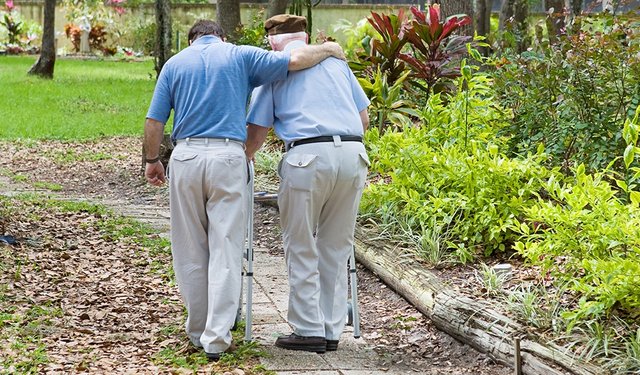Non-drug therapies ‘best’ for managing dementia symptoms | News

The new paper incorporates the views of a panel of experts from across the globe on the order in which clinicians should prioritise treatments for common symptoms of Alzheimer’s.
“This research advocates a significant shift from current practice”
Helen Kales
They said their research provides more specific guidance than was previously available on the management of behavioural and psychological symptoms in patients with the condition.
Published in the journal International Psychogeriatrics, the work was led by the University of Exeter and US researchers at the University of Michigan and John Hopkins University.
It brought together the latest findings on how best to treat symptoms such as psychosis and agitation, ranking available treatments in order of the quality of evidence on them.
For treating agitation in people with dementia, the first four highly ranked treatments were all non-pharmacological approaches.
“We now know that non-drug approaches are the best starting points and can prove effective”
Clive Ballard
Assessment and management or underlying causes, educating caregivers, adapting environment, person-centred care and a tailored activity programme all ranked more highly than any of the drugs.
The highest ranked pharmacological treatment was the antidepressant citalopram, which came in at number six.
The researchers highlighted that, of the currently used atypical antipsychotic drugs, only risperidone reached consensus as a recommended treatment, at number seven in their list.
Study author Dr Helen Kales, from Michigan, said: “This research advocates a significant shift from current practice, recommending that non-pharmacological treatments are a first-line approach for agitation in dementia.
“Aside from risperidone at number seven in the list, none of the other atypical antipsychotic drugs were recommended,” she said. “This is a very welcome change, given the known harms associated with these treatments.”
For the treatment of psychosis, including symptoms such as hallucinations and delusions, the panel advocated a thorough assessment and management of underlying causes as the first approach.
“It’s heartening to see these researchers advocating psychological interventions instead”
Sally Copley
The atypical antipsychotic risperidone came second, as the only pharmacological treatment with any supporting evidence that it works, noted the panel.
This they said highlighted a particular gap in the treatment of psychosis in those with dementia, emphasising that it should be a priority area for further research.
Overall, the DICE (Describe, Investigate, Create and Evaluate) therapy approach, which involves identifying triggers, and using music were both found to be effective in managing symptoms without prescribing drugs.
Professor Clive Ballard, from the University of Exeter Medical School, said: “Symptoms such as psychosis and agitation can be particularly distressing and challenging for people with dementia.
“Many commonly prescribed medications can cause harm, in some cases significantly increasing risk of stroke or death,” he said. “We now know that non-drug approaches are the best starting points and can prove effective.

New drug may provide relief from psychosis in dementia
Clive Ballard
“This research provides more specific and targeted guidance to support clinicians to give the best possible treatment options,” said Professor Ballard.
Sally Copley, director of policy, campaigns and partnerships at Alzheimer’s Society, said: “Drug treatments can have harmful side-effects so it’s heartening to see these researchers advocating psychological interventions instead.
“This study provides further evidence that people with dementia can manage their symptoms effectively with non-drug treatments, but now we need this theory to be put into practice,” she said.
But she warned that, after decades of “squeezed funding” and a lack of training and resource, the current system was “just not equipped” for such a change.
“Unless the government takes action, we will be unable to make the shift away from anti-psychotic drugs and provide better care for people with dementia,” said Ms Copley.